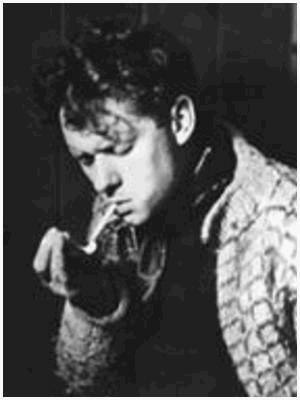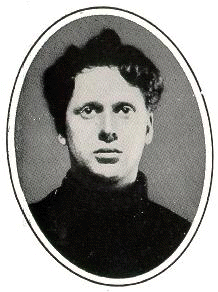Of Dylan Thomas
Original Edition
Introduction by
Paul Muldoon
(New Directions)

... to do it all over again: to bellow out his poetry wares with his wonderful cracked Welsh voice, to down yet another dozen slugs, arguing, yelling, getting blowsy, getting laid, becoming famous, raging not only against the dying of the light but raging against his body, against his own survival.
This was a real poet from the far shores who had come to save us from our witless boredom, those of us stuck in "graduate programs" in "English lit" in Bloomington, Austin, Bennington, Mount Holyoke, Bryn Mawr ... our savior: a dumpy, paunchy, stale-smelling, eye-glazed verse-master with his shirt untucked, a real and apparently live bard who had come to free us from our lives of tedium and order there in our clean elm-lined university towns, this man from Swansea sent to jolt us out of our moronic lives and nights frowning over moldy Milton, popish Pope, dry Dryden ... to save us from all our boring American peer poets: Eliot, Penn Warren, Ransom, Tate.
"Don't you love him?" we asked a friend from Cambridge. "Well," she said, "You remember how the old rhyme goes:"
- Taffy was a Welshman
Taffy was a thief...
"Fern Hill," "A Child's Christmas in Wales" and "Under Milk Wood" are the narrative prizes he left us. The lyrics? "If I were tickled by the rub of love, / A rooking girl who stole me for her side .../ If the red tickle as the cattle calve..." doesn't exactly make sense, but it doesn't have to make sense, especially after you have heard Thomas himself bellow it out.
But the puzzle-poems, the ones we treasured so long ago: they don't make it through our fifty-year filter ... don't seem as original as once we thought, filled as they are with tricks, puns, ambiguities --- shades of Shakespeare --- that we thought so important then, that we are not so sure of now.
Some lines are precious; some are too precious. "Out of a lair in the flocked leaves in the dew dipped year / To eat your heart in the house in the rosy wood" seems to have a few too many prepositional phrases in it; ultimately,seems to go on too long.
- And I must enter again the round
Zion of the water bead
And the synagogue of the ear of corn
Shall I let pray the shadow of a sound
Or sow my salt seed
In the least valley of sackcloth to mourn
The majesty and burning of the child's death.
Thomas is, after all this time, still punning ("the ear of corn"), but the verse seems lopsided, more, distant and cruel. Should we really be able to believe in "the majesty ... of the child's death?" Majesty? Is that the right word?

And whenever we think of Dylan Thomas, we think on that mini-poem of childhood, so long ago, for he was, forever, a child for himself, and to the world, under his own Milkwood ... "quick to get dirty, curly," one who would always be "the man in the wind and the west moon."
- Though they be made and dead as nails.